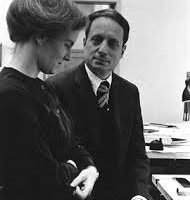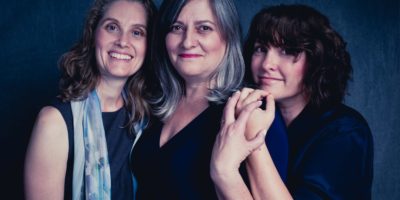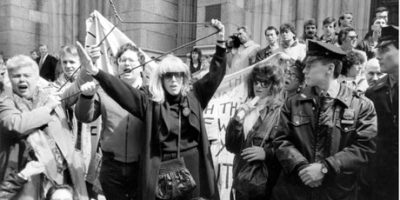Women Fighting: Shani Boianjiu and Yael Dayan
Now that the Pentagon has lifted the ban on women serving in ground combat units in the U.S. military, American Jewish women have another reason to read Shani Boianjiu’s The People of Forever Are Not Afraid, a novel about three young women who serve in the Israeli Defense Forces.
Some books are born great, some become great, and some have greatness thrust upon them. Boianjiu’s novel belongs to the third category — a book whose hype was at its peak several months before it was published, when translation rights were sold to 22 countries and an excerpt was published in the New Yorker magazine. Though armed with advance praise from Nicole Krauss on one side of the ocean and Etgar Keret on the other, the novel received more lukewarm critical appraisal upon publication in October 2012 by Random House’s new Hogarth imprint.
Boianjui is a native Israeli from Kfar Vradim, a part of the country known as the “periphery” to distinguish it from the major cities, but she wrote the beginnings of this book as a final project for her creative writing degree at Harvard. From there it caught the attention of legendary literary agent Andrew Wylie, who sold the rights around the world. Somewhat surprisingly, it has yet to come out in Hebrew, where Boianjiu remains still very much on the literary periphery.
The circumstances of the book’s publication are unusual: Most Israeli authors are published first in Israel and only those who meet with the highest levels of success domestically stand the chance of being published in the US, where a notoriously small proportion of translated titles are published annually. Moreover, Boianjiu elected to write in English, perhaps because the experiences she describes are all too familiar to Israelis over the age of 18, for whom military service is compulsory. The tedium and boredom of war that Boianjiu depicts — Avishag stands guard, Yael amuses herself by flirting with the younger men she trains to shoot, Lea watches Arabs pass by at checkpoint every morning — would seem surreal and compelling only to readers who have not themselves donned an IDF uniform. As Lea’s mother tells her in the week before her draft, while the two of them shop for army supplies like an American mother and daughter raiding the mall for school supplies on Labor Day weekend, “It’s going to be OK. Everyone does this. These will be the best years of your life.”
Boianjiu’s novel is not without precedent, so long as one is prepared to jump back fifty years. In 1959, Yael Dayan, daughter of the famous military general Moshe Dayan, published New Face in the Mirror, an account of a young girl’s military service, which she wrote during her free time on base. Her novel was published first in English and only then in her native Hebrew, a fact little known to most Israelis today, to whom she is famous as a politician and journalist. Though born on a kibbutz in Nahalal (also on the Israeli periphery), Dayan, like the cosmopolitan Boianjiu, was living in Paris when her novel came out; she was 19. Her novel, too, is a heady cocktail of sex and war. While not crawling through mud or standing guard with her gun at night, Dayan’s heroine, Ariel Ron, is exploring her ability to manipulate and dominate men; at one point during her military leave she seduces two brothers simultaneously, convinced that she can prevent them from finding out even when they all stay at the same seaside cottage.
Like The People of Forever Are Not Afraid, Yael Dayan’s novel has much to say about fear. Ariel is strongly influenced by the image of her aloof and imperious father, the famous Area Commander who is clearly modeled on Moshe Dayan: “My father, I remembered, had no fears at all. In that he differed greatly from me. But he could not be called a courageous man because he had no fears to overcome. He knew nothing of the hesitations of fear; the quick trembling, the loud heartbeats, the paleness, the shaking hands, the sudden ache that freezes the body.” Boianjiu’s heroine Yael is inspired by her mother, who served as an air traffic controller on a beach in Sinai during her own military service, even though such a role was highly atypical for a Yemenite woman recruit. Moreover, both Ariel and Yael find themselves in the same role, training soldiers just a year younger than themselves in how to shoot a rifle. At one poiunt Boianjiu’s Yael pulls her trainee, Boris, to the sand beside the shooting range, takes off her uniform, and seduces him next to their guns: “Boris’ movements are lumbering and hesitant and young and unknowing. And he is not afraid.” In Dayan’s novel, the trainee is an 18-year-old girl terrified of pulling the trigger, who inspires scorn and loathing in Ariel, until finally she admits, “I realized that I, too, was capable of fear; but not capable of admitting it, even to myself.”
We have Yael Dayan and Shani Boianjiu to thank for bringing the Israeli woman soldier’s experiences to life for English readers. As for the gap between 1959 and today, well, there doesn’t seem to be much of a gap to bridge. The new faces in the mirror are the same faces, and the people are forever afraid.




